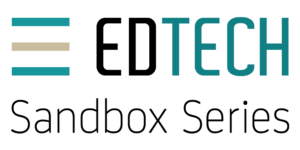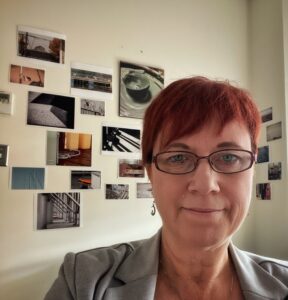*Note: This session has passed. Please view the recording and resources below.
About the Session

In this hands-on sandbox session, you will create a hypothes.is account and trial public, group and review LMS embedded activities. We will discuss how hypothes.is helps engage students in exploratory reading, provides informal opportunities for sharing personal experience, and highlights misinformation. We will demonstration how AI can be used to enhance and generate social interaction prompts.
In this Sandbox workshop, we will explore how to:
- enhance a sense of belonging for students in online and in-person courses
- develop effective writing prompts using AI
- annotate videos and images
- show examples of co-create knowledge through annotated readings
- use hypothes.is in multiple use-cases
- discuss rubrics for assessing student work
Recording and Resources
-
- Transcript: EdTech Sandbox Series: Exploratory Learning – Effectively Integrating AI with Hypothes.is (PDF)
- Transcript: EdTech Sandbox Series: Exploratory Learning – Effectively Integrating AI with Hypothes.is (Word)
- Slides: EdTech Sandbox Series: Exploratory Learning – Effectively Integrating AI with Hypothes.is (PDF)
- View recording on media.bccampus.ca
Event Recap
Blogpost – Exploratory Learning: Effectively Integrating AI with Hypothes.is
About the Facilitators
 Julia Grav (she/her) is an entrepreneur in the Victoria technology sector, managing a web development and design business for over 10 years. She actively consults with small businesses, not-for-profits, and NGOs to improve their branding, optimization, increase their web presence, and build customized website applications.
Julia Grav (she/her) is an entrepreneur in the Victoria technology sector, managing a web development and design business for over 10 years. She actively consults with small businesses, not-for-profits, and NGOs to improve their branding, optimization, increase their web presence, and build customized website applications.
She began teaching at Camosun College in 2014 in the Department of Computer Science and is now a new faculty instructor in the School of Business, Applied Business Technology. She received her Bachelor of Arts from Concordia University and spent three years teaching in Turkey. In 2017, Julia graduated from Simon Fraser University with a Master of Education in Curriculum and Instruction.
Julia’s teaching philosophy aligns with the principles of Universal Design for Learning, bringing learning science and inclusivity into the forefront of her classroom. She emphasizes choice and autonomy, along with multiple, reiterative low-stakes assignments, to enhance her students’ learning experience. By offering timely feedback highlighting effort, and including positive strategies for future success, Julia encourages her students to build and develop their mastery in technology.
 Emily Schudel (she/her) is an instructional designer in the eLearning unit of the Centre for Excellence in Teaching and Learning at Camosun College and has over 25 years’ experience. She has worked with faculty to enhance their courses with technology, taught blended courses combining face-to-face with online technologies, and delivered distance education using synchronous technologies (such as narrow-cast satellite, web-conferencing, audio-conferencing, and tele-conferencing) and asynchronous technologies (like D2L). Recently, Emily became Creative Commons certified and now collaborates with faculty on open education projects, using WordPress, Pressbooks, H5P and other open platforms.
Emily Schudel (she/her) is an instructional designer in the eLearning unit of the Centre for Excellence in Teaching and Learning at Camosun College and has over 25 years’ experience. She has worked with faculty to enhance their courses with technology, taught blended courses combining face-to-face with online technologies, and delivered distance education using synchronous technologies (such as narrow-cast satellite, web-conferencing, audio-conferencing, and tele-conferencing) and asynchronous technologies (like D2L). Recently, Emily became Creative Commons certified and now collaborates with faculty on open education projects, using WordPress, Pressbooks, H5P and other open platforms.
In her spare time, Emily enjoys hanging out with husband, Kevin, and their many kitties, as well as photography, blogging, walking, meditation, and creative writing.
About the Series
Discover the BCcampus EdTech Sandbox Series, workshops empowering educators, learning designers, and graduate students in B.C.’s post-secondary institutions to explore, experiment with, and evaluate cutting-edge tools for enhancing teaching excellence and student success. Aligned with the B.C. Post-Secondary Digital Literacy Framework, this program emphasizes a support technology perspective, encouraging open-mindedness, curiosity, troubleshooting skills, and the selection of appropriate tools for work and study.
Focus Areas for 2024-2025:
- The AI Sandbox: A space dedicated to experimenting with, and reviewing, artificial intelligence (AI)-based learning technologies.
- The No-Go EdTech Sandbox: A space aimed at examining learning technologies educators, students, and staff should avoid using in teaching and learning, and why.
In these two-hour live streamed webinars, expert leaders will introduce and demonstrate cutting-edge, open, and free, or low-cost educational technology tools.
By actively participating in these sandbox sessions, participants will experiment with tools, work with fellow educators to review features of the tools, gain insights into teaching activities, and discover ways to integrate these tools into courses.
Recordings of the presentations and reviews of the tools will be available on our website following the event.
EdTech Sandbox Series Sessions
- September 18, 2024 — Beyond Surveillance: The Case Against AI Detection and AI Proctoring, Ian Linkletter, BCIT
- October 16, 2024 — Learning Design with ChatGPT: Implications for AI Literacy, Hajime Kataoka, University of Victoria
- November 6, 2024 — Design Smarter: Harnessing Canva’s AI for Enhanced Educational Outcomes, Prabhjot (Prab) Bhamra, University of Toronto
- January 22, 2025 — Exploratory Learning: Effectively Integrating AI with Hypothesis, Julia Grav and Emily Schudel, Camosun College
- February 26, 2025 — Exploring Animaker for Teaching and Learning, Maryam Safa Schneider
